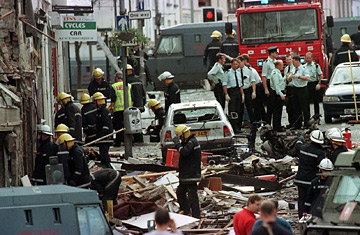
The scene in Market Street, Omagh, County Tyrone, Northern Ireland, immediately after the 1998 bomb attack.
Queen's Bench 2, a lofty, wood-paneled room in the High Court of Northern Ireland, has been turned into something like a busy library. The temporary shelves lining its walls hold thousands of documents in reach of a handful of lawyers in traditional wigs and gowns, making QB2 an unlikely final arena for what some once considered an act of war.
The families of victims of the 1998 Omagh bombing, the worst single attack in Northern Ireland's Troubles, began a civil action that today seeks $28 million dollars in damages from five men they believe were responsible. The case is a legal landmark in the U.K. and Ireland, seeking an O.J. Simpson-style resolution (that is, in his second, civil trial) to a crime of mass murder. Lord Brennan QC, the lead lawyer for the families, said the case was probably unprecedented anywhere. "For the first time, private citizens are confronting terrorists in our courts," he said.
In August 1998, the death throes of Northern Ireland's violence yielded its single deadliest act. A car bomb planted by the breakaway Real IRA exploded amongst hundreds of shoppers in a busy market town called Omagh, 50 miles from Belfast. Twenty-nine people died and hundreds were injured in an act that cut a swath across Irish life. The dead included Catholics and Protestants, people from both sides of the Irish border and from Britain, tourists, the old and the very, very young. It also came at a time when both parts of Ireland had taken a decisive swing away from violence by voting in favor of the peace accord known as the Good Friday Agreement.
But while the politics of compromise crept forward over the ensuing decade — culminating in the election of a stable, power-sharing government last year — Omagh remained an unhealed sore. The hunt for the bombers largely disabled the Real IRA, but fell frustratingly short of convicting anyone for the actual attack on the town.
Last year the complicated prosecution of an electrician accused of assembling the bomb collapsed with consequences that rippled across the judicial system. DNA evidence used in the case was discredited by the judge; police were criticized by the judge for "cavalier" handling of evidence and individual officers were accused of "deliberate and calculated deception" in their testimony.
Exasperated by the failures, six victims' families are now pushing ahead with their civil action, which has been planned for more than five years and enjoyed some financial support from an embarrassed British government. They've issued claims for damages against five men — two suspected of leading the Real IRA, one of providing mobile phones used by the bombers, and two others accused of delivering the bomb to Omagh. The targets of the suit all deny involvement and none are attending the trial. One has not employed lawyers for his defense.
Lord Brennan says the evidence against the five men is "solid and reliable" — it's just not up to the criminal standard of proving "beyond all reasonable doubt" that they bombed Omagh. But the civil case doesn't need that cast-iron proof Brennan and his team need only convince a judge "on the balance of probabilities"; in other words, that the five defendants probably were the Omagh bombers.
That will still require a vast and fairly intricate body of evidence. The trial is expected to last six weeks — a verdict will take even longer — and will also make legal history by convening a hearing in Dublin, a different sovereign jurisdiction, to take evidence from police officers there. An FBI informer who infiltrated the Real IRA may also become involved. Court sessions are being beamed by video to a prison in the Republic of Ireland, where two of the defendants are serving sentences for terrorist offenses.
Relatives of the Omagh victims still want a public inquiry to address the failings of the criminal justice system, but have a feeling that this civil trial is their last, best chance to apportion blame for the deaths of their loved ones. Showing that the five defendants bombed Omagh will be difficult; collecting any damages may prove even harder.
"This isn't about money," said Victor Barker, whose 12-year-old son James was among the dead. "To put it in crude terms, it's about naming and shaming those responsible for what they did in 1998. I'm afraid if there's going to be any justice for the relatives, this is it."
